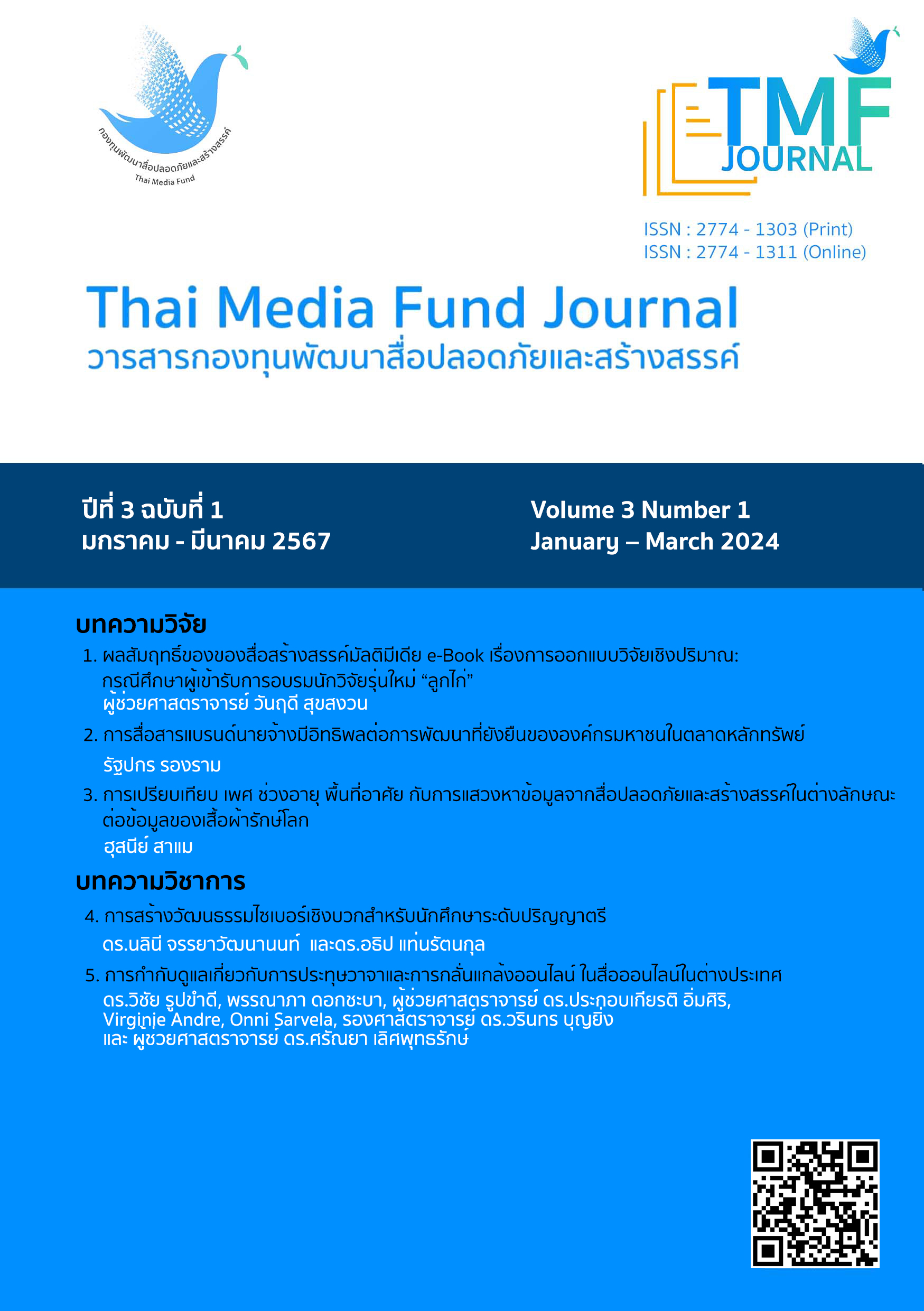การสร้างวัฒนธรรมไซเบอร์เชิงบวก สำหรับนักศึกษาระดับปริญญาตรี
Main Article Content
บทคัดย่อ
บทคัดย่อ
การใช้สื่อออนไลน์ในยุคไซเบอร์มีความสำคัญอย่างมาก การสร้างวัฒนธรรมไซเบอร์ จึงเป็นพื้นฐานสำคัญเพื่อช่วยให้มีความรู้ ความเข้าใจ วิเคราะห์ และปรับตัวให้เข้ากับโลกออนไลน์ที่มีอิทธิพลและบทบาทสำคัญต่อวิถีชีวิตของมนุษย์ รวมถึงการใช้ชีวิตประจำวัน การสร้างวัฒนธรรมไซเบอร์เชิงบวกมีส่วนสำคัญในการลดปัญหาที่เกิดขึ้นจากการใช้สื่อออนไลน์ เช่น การส่งเมล์หลอกลวง การกระทำความผิดกฎหมายทางไซเบอร์ การละเมิดหรือหมิ่นประมาทผ่านระบบคอมพิวเตอร์ การเปิดเผยข้อมูลส่วนบุคคล การหลอกลวงให้โอนเงิน หรือหลอกลวงให้หลงรัก ซึ่งการกระทำดังกล่าวส่งผลกระทบให้เกิดความสูญเสียต่อทรัพย์และความรู้สึกของผู้ถูกกระทำเป็นอย่างมาก
ดังนั้น การสร้างความวัฒนธรรมไซเบอร์ในเชิงบวกกับกลุ่มนักศึกษา จะเป็นส่วนหนึ่งในการลดและป้องกันปัญหาที่เกิดขึ้น รวมถึงการรู้เท่าทันต่อภัยคุกคามทางไซเบอร์ต่าง ๆ ซึ่งส่วนสำคัญที่เกี่ยวข้อง ได้แก่ การสร้างความและส่งเสริมให้มีจิตสำนึกที่ดีในการมีส่วนร่วมในการเสริมสร้างวัฒนธรรมไซเบอร์เชิงบวก เพราะในปัจจุบัน ใช้เวลาอยู่กับคอมพิวเตอร์และไซเบอร์ทุกวัน ถ้าวัยเด็กและเยาวชน หลงกระทำผิดทางไซเบอร์จะถูกลงโทษเช่นเดียวกับผู้ใหญ่ที่พ้นนิติภาวะแล้ว จึงควรมีแนวทางเพื่อชะลอหรืออาจจะหยุดการกระทำผิดทางไซเบอร์ของนักศึกษา นอกจากการใช้กฎหมายในการกำกับดูแล การให้ความรู้ และถ่ายทอดวิธีการรับมือกับปัญหาอย่างเหมาะสม
Article Details

อนุญาตภายใต้เงื่อนไข Creative Commons Attribution-NonCommercial-NoDerivatives 4.0 International License.
เอกสารอ้างอิง
Bank of Thailand. (2023) Top 3 Cyber threats that Thai people have been deceived the most. Retrieved from https://shorturl.asia/luoIh
Chainwong, P., Skulphan, S., & Thapinta, D. (2020). Being Cyberbullied and Suicide Risk among Youths. The Journal of Psychiatric Nursing and Mental Health, 34(3), 133-151.
Cyber Security Maintenance ACT, B.E. 2019. (2019, 27 May). Thai Government Gazette, pp. 20-51.
Digital Economy Promotion Agency. (2019). Digital Economy Promotion Agency action plan. Retrieved from https://www.depa.or.th/storage/app/media/Action%20Plan-depa-62.pdf
Everett, M. Roger. (1995). Diffusion of Innovations. 4th ed. New York : Free Press.
Faculty of Science and Technology Dhonburi Rajabhat University. (2019). Learning in the 21 century social media. Retrieved from https://sci.dru.ac.th/dlr/files3/Media%20Online.pdf
Kongboonma, T. (2019). The rule of law and the law on cybersecurity. Retrieved from https://www.constitutionalcourt.or.th/occ_web/ewt_dl_link.php?nid=11141
Longdo Dict. (2008). Meaning of Cyber. Retrieved from https://dict.longdo.com/search/CYBER
Matanboon, W. (2022). Violent Behavior in Media Usage armong Children and Youth in Chiang Rai Province. Thai Media Foun Journal, 1(3), 1-31.
Matrakool, A., & Iamviriyakul, I. (2018). Cyber threats are one of the five major global risks, the financial sector is the main target of attacks. Retrieved from https://shorturl.asia/Q6eH4
National Statistical Office Thailand. (2023). Household Information and Communication Technology Use Survey 2023 (Q3). Bangkok: National Statistical Office Thailand.
NIDA Poll. (2023). Cyber Threats. Retrieved from https://nidapoll.nida.ac.th/data/survey/uploads/FILE-1699009763644.pdf
NT Cyfence. (2022). 10 Cyber Threat Prevention Guidelines For small and medium-sized businesses. Retrieved from https://www.cyfence.com/article/10-ways-to-prevent-cyber-threats-for-small-and-medium-businesses/
Office of the National Anti-Corruption Commission. (2021). Anti-Corruption in Digital Disruption. Retrieved from https://multi.dopa.go.th/acoc/assets/modules/news/uploads/0dec3410214c02cec7b616b91b1ee9a4615c192f1f9b76195411401018429554.pdf
Office of the Royal Society. (2020). Cyberculture. Retrieved from https://www.facebook.com/RatchabanditThai/photos/a.3083612691696805/3480081552049915/?type=3
Phohom, K. (2021). Thailand's Cyber Security Dynamics. Journal of Security Perspectives, 1(7), 45-54.
Rogers, E. (2003). Diffusion of Innovations, New York, Free Press.
Rupkumdee, V., Dokchaba, P., Imsiri, P., Andre, V., Sarvela, O., Boonying, V., & Lertputtarak, S. (2023). Guidelines for developing good practices and ethical satandards for presenting content on online media related to Hate Speech, Cyberbullying and Radicalization of the Thai Media Fund. Thai Media Found Journal, 2(4), 24-57.
Sangsuriyong, R. (2021). Transition to Cybersociety in Eastern Economic Corridor. Academic Journal of Humanities and Social Sciences Burapha University, 29(3), 241-269.
Sunyawiwat, S. (2007). Sociological theory: content and basic utilitarianism. Bangkok: Phimluk.
Tawekanachot, R. (2022). Construction of cyber bully scale for undergraduate students. M.Ed. Independent Study in Educational Research and Evaluation-(Plan B) Naresuan University.
Thai News Agency. (2024). Sure and Share. Retrieved from https://tna.mcot.net/category/sureandshare
ThaiCERT. (2023). Statistics Report on Financial Results for the Year 2021-2023. Retrieved from https://shorturl.asia/Z3HK2
Thairath. (2024). Collect and bounce the gun scolding. Lari shot dead 1 hurt 2 claimed revenge through social media. Retrieved from https://www.thairath.co.th/news/crime/2760271
The National Broadcasting and Telecommunication Commission. (2022). Studies to develop mechanisms or measures to prevent bullying Intimidation and harassment of women Children & Youth The campaign channel is conducted through various multimedia media. Bangkok: Office of the National Broadcasting and Telecommunications Commission.
Thumronglaohapun, S., Kummaraka, U., Traisathit, P., Kardkasem, R., Maneeton, B., Manojai, N., Chaijaruwanich, J., Limpiti S., & Srikummoon, P. (2022). Impacts and proper responses of cyberbullying in youth. Thai Media Found Journal, 1(3), 1-22.
Venkatesh, V., & Bala, H. (2008). Technology acceptance model 3 and a research agenda on interventions. Decision Science, 39(2), 273-312.
Wikipedia. (2020). Cyberspace. Retrieved from https://shorturl.asia/o1E8e


